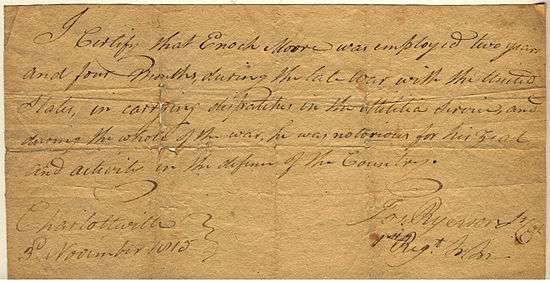Enoch Moore (Loyalist turned rebel)

Enoch Moore (April 16, 1779– August 1841), son of Samuel Moore U.E. and Rachel Stone, married Elizabeth Smith, daughter of James Smith and Hannah Hawksworth, on March 30, 1803 in Old Holy Trinity Church, Lower Middleton, Annapolis, Nova Scotia. Elizabeth was born on April 18, 1784 in Wilmot Township, NS, died on March 3, 1871 and was buried in New Milford Cemetery, Winnebago Co., IL. Enoch was a direct descendant of one of New Jersey's early colonial officials, Samuel Moore.
Enoch's political alignment seemed to swing from one extreme to the other throughout his lifetime. He was born in a Loyalist refugee camp in New York City and was evacuated with his Quaker family,[1] about 1784, to the Annapolis Valley, Nova Scotia where his father, Samuel Moore, became a leader in the Quaker community. He moved to Upper Canada about 1811, where he served as a dispatch rider in the Canadian militia during the War of 1812 against the Americans. His commanding officer was Col. Joseph Ryerson. By 1830, Enoch Moore, had gained the respectable status of school trustee.[2] One of the teachers in his employ was Egerton Ryerson[3] son of Col. Joseph Ryerson, who became the founder of the public school system in Ontario. Enoch's first son, James Moore, is buried beside Col. Joseph Ryerson in the Methodist cemetery in Woodhouse Township, Norfolk County, Ontario.
Even though he was raised in a Loyalist and Quaker home, Enoch was elected Captain of the rebels at Malahide, Ontario during the Rebellions of 1837. Enoch and his brothers comprised one of the most active Loyalist families to join the rebels.[4] Court records show that Enoch was arrested and jailed in London on Dec. 21, 1837, convicted of high treason, sentenced to death, then reprieved on May 19, 1838.[5] Hundreds of his neighbours signed the petition for clemency in the case of Enoch, his brother John, and neighbour Harvey Bryant.[6] His sentence was first commuted to transportation to a penal colony on Van Diemen's Land (Tasmania) for life, and then relaxed to 14 years of penal servitude[7] but he was eventually pardoned and released on a peace bond[8] on Oct. 5, 1838. His brother, Elias Moore, was released after a short stay in jail because the key witness absconded. Elias then returned to his seat in the 13th Parliament of Upper Canada.
Around this same time, Enoch's younger brother, Lindley Murray Moore was founding an Anti-Slavery Society in Rochester, N.Y..
Enoch and his wife and nine of their 11 children immigrated to the United States in July 1840, settling in Ogle County, Illinois. Enoch died the next year in Rockford.
His brother, John Moore, built a fine home in Sparta, Ontario that is still standing, now known as the John Moore House.
References
- ↑ Moore, C. The Loyalists. p.81, Toronto: Macmillan of Canada. ISBN 0-7715-9781-9 (1984)
- ↑ Norfolk County Land Registry, Memorial No. 1783, Registered in Book F ,pages 573,574.
- ↑ Owen, A.E., Pioneer Sketches of Long Point Settlement, p. 125, Toronto: William Briggs. ISBN 0-919302-29-7 (Mika reprint 1972)
- ↑ Fryer, M.B.(ed.), Loyal She Remains, p.228, Toronto: The United Empire Loyalists Association of Canada. ISBN 0-9691566-1-8 (1984)
- ↑ Moore, Robert W., A Black Sheep Loyalist, The Loyalist Gazette Vol.XXV, No.1, November 1987, UEL Assoc. of Canada, pp.20,21
- ↑ http://heritage.canadiana.ca/view/oocihm.lac_reel_c6902/1309?r=0&s=4
- ↑ Read, C., The Rising in Western Upper Canada 1837-8, p.150, Toronto: University of Toronto Press. ISBN 0-8020-6495-7 (1982)
- ↑ Read, C., p.152